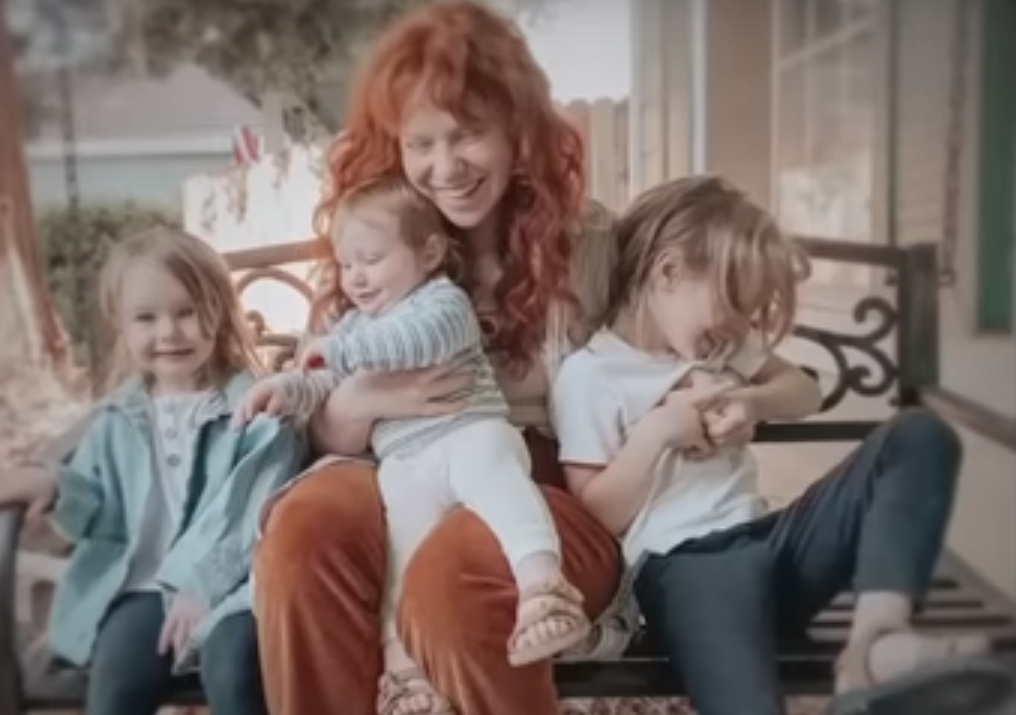Editor's note: American Idol contestant Sara Beth Liebe, who had been ridiculed by judge Katy Perry over being a young mother of three, withdrew from the competition Sunday, April 2.
In recent years, there has been a disturbing trend in our society where women are often shamed for their choices in favor of motherhood, especially family size.
This phenomenon is known as mom-shaming, and it is a pervasive problem that has been exacerbated by the rise of social media and abortion culture.
Unfortunately, celebrities are often at the forefront of this trend, using their platforms to perpetuate harmful stereotypes and shame mothers who do not conform to their narrow standards.
A recent example of this was when Katy Perry mom-shamed Sara Beth Liebe, who is a 25-year-old mother of three, during Liebe’s American Idol audition.
Liebe was incredibly excited to audition for Idol, as any aspiring singer would be. However, she was met with little more than insults from Perry.
In fact, Perry’s hurtful comments perpetrated two harmful myths about motherhood.
[Click here to subscribe to Pregnancy Help News!]
So, let’s analyze what she said, where she missed the mark, and how mindsets and comments like Perry’s are only further fueled by abortion culture.
The audition
Liebe’s audition starts out with her introducing herself as a 25-year-old from California, which leads to compliments from the judges that she looks much younger.
To which she responds, “Bless. You guys are my favorite. I have three kids, so that’s like -”
However, she gets cut off by the judges' immediate responses of disbelief.
Lionel Richie says, “Get away from here.” Luke Bryan settles for a shocked, “What?!” while Perry dramatically gets out of her seat and acts as if she may faint at the news.

Liebe laughs, saying, “If Katy lays on the table, I think I’m going to pass out.”
But Perry then responds, “Honey, you’ve been laying on the table too much.”
The audition clip then cuts to a cute backstage package showing Liebe’s family.

She tells her family she misses them and explains she has a “little family, got married young, and [is] living that life now,” before returning to the judges.
Liebe chats with them a bit more before singing, during which Perry asks, “Is this your dream?” and Liebe pauses, leading to Perry once again insulting her with, “If it’s not your dream, you might need to leave because there’s a lot of dreams behind you.”
Debunking Katy Perry’s motherhood myths
During the audition, Perry’s comments conveyed two myths about motherhood.
Myth 1: A mother can have “too many children” or should be ashamed of how many children she has
By telling Liebe that she had “been laying on the table too much,” Perry was insinuating she had been making too many babies, since she is a mother of three at 25 years old.
This comment was inappropriate and insensitive, implying that having three children was somehow a negative thing that perpetuates harmful stereotypes about large families.
The truth is that shaming women for having children or for having a large family is not okay.
Whether a woman chooses to have one child or 10 within any given time frame is not up to anyone else to judge her for that decision. Unfortunately, our society has a long history of placing unfair expectations and pressure on women to conform to certain norms, particularly regarding motherhood.
In fact, there is a pervasive belief that smaller families are better and that having more than two children is somehow irresponsible or selfish.
This belief is often fueled by the cultural obsession with abortion, which promotes the idea that children are a burden and prevent women from reaching their full potential and achieving their dreams, which is misguided, harmful, and could not be further from the truth.

Large families can be incredibly fulfilling and provide a strong support system for children and parents alike. And without children, there would be no future generations to carry on the traditions, values, and innovations that make our society great.
Shaming women for their family size is also often tied to other forms of discrimination, such as sexism and classism.
Mothers with more than the “acceptable” number of children face many stereotypes and negative assumptions.
One of the most common stereotypes is that these mothers are uneducated or unable to control their reproductive health. This stereotype is often based on the belief that women who have large families do not have access to family planning resources.
However, this line of thinking is flawed because many women who choose to have large families do so because of their cultural or religious beliefs, or because they simply enjoy being a mother.
The culture of abortion also creates a mindset where women are encouraged to have only as many children as they feel they can handle.
In countries where abortion is legal, the focus on individual choice can lead to a culture where large families are seen as a burden. This mindset is reinforced by the media and popular culture, where smaller families are portrayed as more modern and practical.
Additionally, the high cost of raising children can lead to the belief that having more children than necessary is irresponsible and financially impractical.
While it is true that raising a large family can be expensive, this should not be the only factor considered when deciding how many children to have.

Mothers with large families also face assumptions about their personal lives and relationships.
For example, they may be assumed to have a partner who is absent or uninvolved in their children's lives or to have had children with multiple partners.
These assumptions can be hurtful and damaging, reinforcing negative stereotypes about single mothers and families that do not conform to traditional family structures.
Overall, the culture of abortion profoundly impacts how people view family size, and it often leads to the stereotype that having more than the average number of children is bad. This stereotype places immense pressure on mothers and can negatively affect families.
While it is true that raising a large family can be challenging, it does not mean that it is inherently wrong or irresponsible.
Instead, mothers with large families should be respected and supported and should not face discrimination or negative stereotypes.
Tweet This: Katy Perry’s hurtful comments to American Idol Sara Beth Liebe perpetrated harmful myths about motherhood.
Myth 2: Motherhood prevents women from achieving their dreams
Perry also told Liebe there are “a lot of dreams behind” her simply because she already has three children.
This also couldn’t be further from the truth, and this myth is often pushed because the promotion of abortion can lead to a devaluation of motherhood itself.
When women are told that the only way to achieve true freedom and equality is to avoid motherhood altogether, it sends a message that motherhood is inferior or less important than other pursuits or that they can’t also pursue other dreams as well.
This is a damaging and inaccurate view, as motherhood is a vital and profoundly fulfilling role.

Additionally, while motherhood is a significant life change that can bring new challenges and responsibilities, it is essential to remember that having children does not mean the end of your dreams and aspirations. It is never appropriate to tell a mother that her dreams are behind her or over because she has children.
First and foremost, it is important to recognize that motherhood can be an enriching experience that can inspire new dreams and goals.
Many mothers find that having children motivates them to work harder towards their goals, and they may even develop new aspirations related to parenthood.
Furthermore, although caring for children requires significant time and energy, pursuing personal and professional goals alongside parenthood is still possible. Many mothers successfully balance parenting with pursuing their careers, continuing their education, or pursuing creative endeavors.
Telling a mother that her dreams are behind her or over because she has children can be incredibly discouraging and dismissive of her personal aspirations and identity. It can also perpetuate harmful stereotypes about motherhood, implying that women must choose between having a fulfilling family life or pursuing their dreams, which is not true at all.
Everyone's journey is different, and there is no right way to balance motherhood with personal aspirations. What works for one mother may not work for another, and respecting each mother's individual choices and goals is important. In fact, many of the former American Idol winners and contestants such as Kelly Clarkson, Carrie Underwood, and Gabby Barrett Foehner, among others, successfully navigate both their careers and motherhood, which should be enough to show Perry her assumptions are misguided at the least and flat out wrong at the most.
Liebe’s uplifting response
As many can imagine, Perry’s comments to Liebe created quite an uproar online from fans who could not fathom her mom-shaming, causing many to ask how it made Liebe feel or offer encouragement.
To address the situation, Liebe posted both an Instagram reel and on TikTok where she explained:
“At the start of my audition, before I sang, I mentioned that I had three children and was a young mother. And Katy Perry made a ‘joke’ that… wasn’t super kind, and yeah, that’s what this is all I guess about. I don’t really have too much to say on my feelings about it because I feel like it’s probably pretty self-explanatory. I mean, it was embarrassing to have that on TV, and it was hurtful, and you know… that’s that.”
“But I did want to take this opportunity to just say that I think that women supporting and uplifting other women is so cool. And I think that mom-shaming is super lame. And I think that it’s hard enough to be a mom, and it’s hard enough to be a woman, and I also wanted to take this opportunity to say that I see all of the young moms, and just moms in general, who have commented on all of the videos and posts and everything. And I just wanted to say that I see you, and I hear you, and I am grateful for you, and you’re worthy. And keep loving your babies. Nobody deserves to feel crappy about that like I mean, bottom line. I don’t think there’s really more to it. I think if you’re a good mama and you love your babies, that’s all that really matters, and other comments just don’t feel necessary.”
Conclusion
I couldn’t have agreed more with Liebe’s promotion of positive mom culture.
The trend of mom-shaming and shaming women for their family size is not okay.
It perpetuates negative stereotypes and discrimination against women, and it can be incredibly hurtful to mothers who are doing their best to raise happy and healthy children.
Instead of judging and criticizing women for their choices, we should be supporting and empowering them, regardless of their family size or parenting decisions.
Tweet This: Instead of criticizing women for their family size or parenting decisions we should be supporting and empowering them.
By creating a life-affirming culture of positivity and inclusivity, we can build a better future for all families and children.
In addition, if you are facing an unexpected pregnancy that feels like an obstacle to achieving your dreams, remember that having a child does not have to mean giving up on your goals.
Tweet This: If you are facing an unexpected pregnancy remember that having a child does not have to mean giving up on your goals.
You can still achieve everything you want in life. It may require more planning, organization, and hard work, but you can still achieve your goals with determination and perseverance.
It may also be helpful to break down your goals into smaller, more manageable steps, so you can track your progress over time as you and your baby face this journey together.







